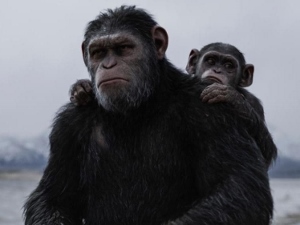[8]
Matt Reeves (Cloverfield, Let Me In) directs his second installment of the prequel trilogy to the famous sci-fi franchise. War isn’t as epic and enthralling as the spectacular Dawn of the Planet of the Apes, but it’s still a damn fine conclusion to the story of Caesar (Andy Serkis). It’s also kinda neat to see how it dovetails into the original film series. The plot is stripped down to bare essentials this time around. Caesar and the apes are trying to live their own lives in the Western wilderness, but one rogue Army colonel (Woody Harrelson) is hell-bent on wiping them out. Early in the film, the colonel crosses a line, forcing Caesar into revenge mode. Caesar’s good buddy Maurice (the large orangutan from the previous two films) tries to temper his hatred and bring him back to the ‘good side,’ so to speak. While the ape population treks to a faraway place where they think they’ll be safe from humans, Caesar stays behind to seek his vengence on Harrelson’s character. But when the apes are captured by Harrelson’s army, War for the Planet of the Apes becomes a prison escape movie before ending in typical summer Hollywood fashion, with lots of explosions and bloodshed.
What makes this third film work isn’t the special effects, which are goddamned jaw droppingly spectacular. And it isn’t the cast. Serkis does a great job as Caesar and Steve Zahn is memorable as an eccentric ape that joins the cause in act two. I’m not on the bandwagon that says Serkis should be nominated for an Oscar. I wouldn’t be upset if he was. I just think mo-cap performances are more complicated than that — you’d have to nominate the animators as well as the mo-cap actor, I think.
No, what set’s War apart is the raw emotion it conjures. Like a silent film sporting little dialogue, War allows the audience to fill in a lot of gaps. You get to determine what a pained expression means, what a wailing scream means. What silent glances mean. And these things mean a ton, and it’s always good to get an audience thinking… and feeling. The Apes movies are also archetypal, and Reeves cashes in on that fact — there’s the father/son card being played here, there’s the betrayal and redemption of turncoats and traitors, and there’s good old fashioned self sacrifice. Like a Shakespearean play, War for the Planet of the Apes has a hero who veers into evil deeds and a villain who ends up becoming sympathetic. Everything becomes topsy-turvy and we have only our moral compasses to guide us. Like all great science-fiction and allegory, this movie series allows you to transpose the fiction over our reality, and hopefully — just maybe — learn something from the experience.
I think this trilogy is perhaps the most noble Hollywood effort in many, many years, because it asks its audience to identify with the ‘other,’ to have empathy for them, and to take a chance on peace. For many, I’m sure it’s just another action movie. But with Dawn of the and War for the Planet of the Apes, I think Matt Reeves has created two beautiful films that will be studied years from now as fascinating examples of popular culture birthed in the backdrop of 9/11, ‘Black Lives Matter,’ building walls, and Trump-induced polarization.
And bring your hankie. I cried like a bitch.



